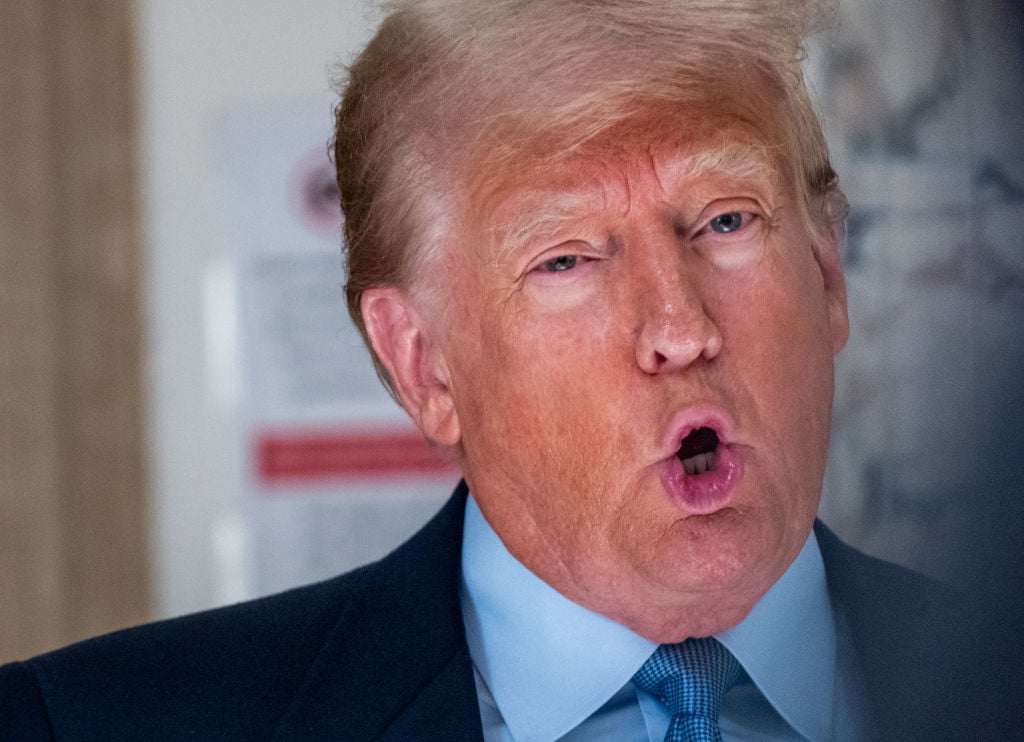In New York, Judge Arthur Engoron issued a stern warning to Donald Trump and others involved in his civil fraud trial, urging them to maintain decorum during the proceedings. This came after the former president displayed his frustration by gesticulating and speaking audibly to his legal team while a witness, real estate appraiser Doug Larson, was testifying against him.
State attorney Kevin Wallace asked Judge Engoron to intervene, requesting that the defense refrain from making comments during the witness’s testimony, noting that these comments were audible on the witness’s side of the courtroom. In response, the judge directed everyone to lower their voices, especially if their intent was to influence the testimony.
The 2024 Republican frontrunner attended the trial for the second consecutive day, closely observing proceedings that pose a threat to his real estate empire and his image as a wealthy businessman. While he was present during the first three days, he had skipped the previous week. On Tuesday, he briefly left to provide a deposition in an unrelated lawsuit.
In a pretrial decision made last month, Judge Engoron ruled that both Trump and his company, the Trump Organization, had engaged in years of fraudulent activities by exaggerating the values of his assets and net worth in annual financial statements, which were used to secure deals and favorable terms on loans and insurance. As a penalty, Engoron ordered the appointment of a court-appointed receiver to oversee certain Trump entities, casting uncertainty on the future management of Trump Tower and other prestigious properties. However, an appeals court has temporarily halted this action.
On his way into court, Trump refrained from discussing the case with the waiting TV cameras, reserving his customary criticism for New York Attorney General Letitia James’ lawsuit during a morning break.
Within the closed courtroom, Trump’s irritation became apparent as Larson provided his testimony. Trump’s legal team aimed to undermine the state’s claims that his top corporate associates had manipulated property values and financial statements to boost his profits.
In a series of questions, Trump’s lawyer, Lazaro Fields, attempted to establish that Larson had, at one point, underestimated the projected 2015 value of a Wall Street office building owned by Trump by $114 million. Larson contended that the “values were not wrong – it’s what we knew at that time.”
Trump expressed his frustration during the interaction.
During Tuesday’s proceedings, Larson testified that he had never consulted with or authorized the Trump Organization’s former controller, Jeffrey McConney, to attribute his expertise as an outside expert in the valuation spreadsheets used to compile Trump’s financial statements.
On Wednesday, Fields accused Larson of falsehood, citing an email exchange between McConney and the appraiser from a decade ago. This led to a heated exchange between the defense and state teams, with Trump’s lawyer, Christopher Kise, implying that Larson might be at risk of perjury and needed to be informed about his rights against self-incrimination. State lawyer Colleen Faherty labeled Kise’s comments as “witness intimidation.”
Following Larson’s removal from the courtroom, Kise argued that he was merely safeguarding the witness’s rights, while state lawyer Kevin Wallace criticized the defense’s actions as “a performance” for the media. Ultimately, Judge Engoron allowed Larson to return and answer the question without legal warnings. Larson responded that he did not recall the email.
When asked again if he understood that McConney had sought his input for valuations, a weary Larson replied, “That’s what it appears.”
During a court break, Trump voiced his displeasure about the exchange, alleging that the government had concealed critical information. He stated, “See what’s happened? The government lied. They just lie. They didn’t reveal all of the information that they had. They didn’t reveal all the evidence that made me totally innocent of anything that they say.”
Following Larson’s testimony, state lawyers called Jack Weisselberg, the son of the former long-serving finance chief of the Trump Organization, Allen Weisselberg. Jack was responsible for arranging financing for Trump while working as an executive at Ladder Capital.
Trump’s civil trial revolves around six claims from New York Attorney General Letitia James’ lawsuit that were not resolved in Judge Engoron’s pretrial ruling, including allegations of conspiracy, insurance fraud, and falsifying business records. The case will be decided by Judge Engoron, as state law does not permit a jury in this type of lawsuit.
This altercation on Wednesday is the most recent clash between Trump and Judge Engoron. Earlier in the trial, Trump had publicly criticized a key court staff member on social media, leading the judge, a Democrat, to impose a limited gag order preventing the parties involved from making disparaging comments about his staff. Last year, Engoron held Trump in contempt and imposed a $110,000 fine for his slow response to a subpoena from Attorney General James’ office.
On Tuesday, Trump had commented outside the court that he had come to like and respect Judge Engoron, but he believed that Democrats were treating the judge unfairly, likening it to being “pushed around like a pinball.” He stated, “It’s a very unfair situation that they put me in.”


















